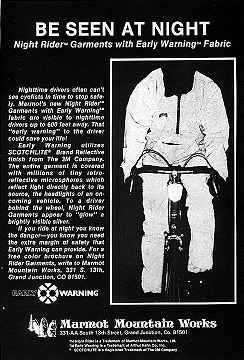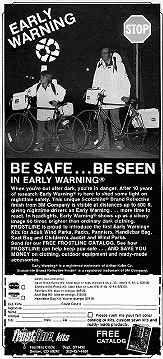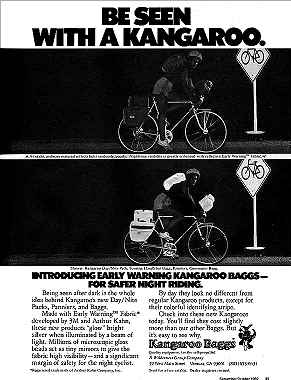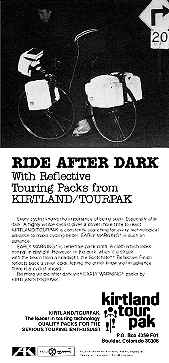 |
The IllumiNITE™ fabric
described on the previous page isn't the first reflective fabric that has been been given
misleading promotion. The ads reproduced here all appeared in Bicycling magazine
in 1980. Click on any of the images to view a larger version. The clothing and baggage items shown here were made of Early Warning™, a reflective fabric developed in part by the 3M Corporation. This fabric had reflective glass beads adhered to its surface. A patent on the process, US reissue patent 030892, indicates that the beads were "cascaded" onto the surface rather than printed, as with IllumiNITE. As with the Performance Bicycle IllumiNITE promotion, the reflective cloth is emphasized by omitting equipment that might compete with it. The Kirtland ad shows no reflectors or lights. Neither does the Kangaroo Baggs ad, in which it appears that the reflective tape -- also a 3M product -- on the bicyclist's Bell Biker helmet has been retouched or covered over to keep it from drawing attention away from the reflective cloth. In this ad too, the bicyclist's clothing appears suspiciously dark compared with the bicycle frame and the shoes. The Marmot and Frostline ads do show reflectors, and the Frostline ad shows what may be either headlamps or front reflectors, partly hidden behind the handlebar bags. The advertising copy in all of these ads is misleading. It fails to mention that in many impending collisions with motor vehicles, the motorist's headlights do not illuminate the bicyclist, and it does not mention any risks other than those of motor vehicles. In particular, it avoids mentioning that a bicyclist is required by law and for safety to use a headlight. It is astonishing that a company with the engineering and legal resources of 3M would involve itself in promotions such as this. As with IllumiNITE fabric, the Early Warning fabric could in no way substitute for the equipment that is omitted from the ads. A bicyclist equipped as shown in these ads (except perhaps the Frostline ad) who had a collision at night could have a good case in a lawsuit against 3M and the clothing manufacturer. To its considerable credit, Bicycling magazine commissioned tests of Early Warning fabric, and published an article in its June 1981 issue describing the results. The article indicated that Early Warning fabric was, on average, only a few times brighter than plain white cloth and that there was wide sample-to-sample variation. Some samples had no measurable reflectivity. One problem: the glass beads were reflectorized on one side and clear on the other, but there was no way to orient them during manufacture. Only about 1 bead in 6 actually worked. Also, Early Warning fabric loses its reflective properties when wet. John Schubert, author of the Bicycling article and now an Effective Cycling Instructor and expert witness in bicycle accident cases, has the following comments about the Early Warning and IllumiNITE promotions:
Bicycle accessories made of Early Warning fabric were a short-lived phenomenon. As noted in Schubert's article, some equipment manufacturers were themselves not happy with the fabric's reflective performance. Schubert's article, and poor sales, speeded its disappearance from the market. Return to expert witness page |
Marmot Mountain Works ad, |
|
 |
|
| Frostline ad, Bicycling, September/October 1980, p. 11 |
|
 |
|
| Kangaroo Baggs ad, Bicycling, September/October 1980, p. 35 |
|
 |
|
| Kirtland ad, Bicycling, November/December 1980, p. 4 |